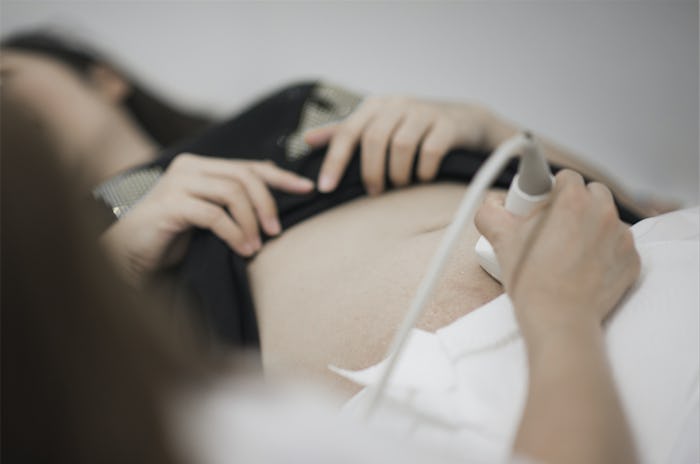Life

Here's How Your OB Knows The Umbilical Cord Is Around Your Baby's Neck
When you're pregnant, it's natural to want to do everything you can to keep your baby safe. Usually, part of "keep your baby safe" means worrying about, well, pretty much everything. One common fear moms-to-be have is what the umbilical cord is around a baby's neck. I mean, it seems super dangerous. So, how does your OB know the umbilical cord is around your baby's neck? And perhaps more importantly, what can they do with that information that will help you deliver your baby safely?
According to Parents, it's actually super common for your baby to have their umbilical cord wrapped around their neck. Surprisingly, it usually isn't harmful to your baby. Parents also notes that this condition, also called having a nuchal cord, often goes undiagnosed until a baby is born, when a doctor or midwife feels for the cord after delivering the baby's head and can loosen it or slip it off. One study published in the journal Ultrasound in Obstetrics and Gynecology showed that while it is possible to diagnose a nuchal cord via ultrasound, that diagnoses is not reliable, and more importantly, not able to predict which babies will have a problem during labor and delivery. According to the March of Dimes, the best way to know if a cord issue is causing problems is to monitor your baby's heart rate during labor and delivery.
A nuchal cord — or the official name for when your baby has their umbilical cord wrapped around their neck — is surprisingly common. According to Parents, 25 to 40 percent of babies are born with this condition, and it can't be prevented. Yikes. But as disturbing as it sounds for your baby to have something around her neck, most of the time, it's no big deal. The same site notes that because your baby gets oxygen from you through their umbilical cord, and not by breathing through their mouth or nose, as long as their cord doesn't get compressed it can be unwrapped or loosened by your health care provider when they deliver your baby.
And again, according to the aforementioned study published in the journal Ultrasound in Obstetrics and Gynecology, your provider probably won't rely on a diagnosis via ultrasound to determine whether or not your baby's cord will cause a problem during labor, or whether or not you'll be required to give birth via C-section in order to ensure the safety of your baby (and you). This is, for better or worse, a "during labor and delivery" situation that requires your OB-GYN to make informed medical decisions.
According to Baby Center, a nuchal cord can occasionally cause problems for your baby during labor and birth, but only if it is wound too tightly around your baby's neck or becomes compressed, which may limit blood flow and oxygen from reaching your baby and, as a result, cause injury. If it is wound too tightly, the site notes that your OB-GYN or midwife might clamp and cut their cord as soon as your baby's head is delivered. If your baby's heart rate drops during labor, your provider might recommend constant monitoring to know if and/or when birth interventions might be necessary to keep your baby safe. But again, and according to the March of Dimes, generally babies with nuchal cords are born healthy, without any complications, and the condition only rarely requires a C-section.
Baby Center reports that if your baby's heart rate stays stable during delivery, after your baby's head is born, your obstetrics provider can either loosen it from the babies neck allowing her shoulders to slip through the loop, or pull it over your baby's head before their shoulders are born. One study published in the Journal of Midwifery and Reproductive Health suggests that it may be better to delay cord clamping in babies who have their cords wrapped around their neck, to avoid complications from reduced blood flow to your baby during delivery.
It's difficult if not otherwise impossible not to worry when you're pregnant and preparing to bring another human being into the world. But if you've found yourself a qualified, competent health care provider, the research is clear: your chances of delivering a healthy baby, even if the umbilical chord is wrapped around their neck during childbirth, are pretty high.
Watch Romper's new video series, Romper's Doula Diaries:
Check out the entire Romper's Doula Diaries series and other videos on Facebook and the Bustle app across Apple TV, Roku, and Amazon Fire TV.